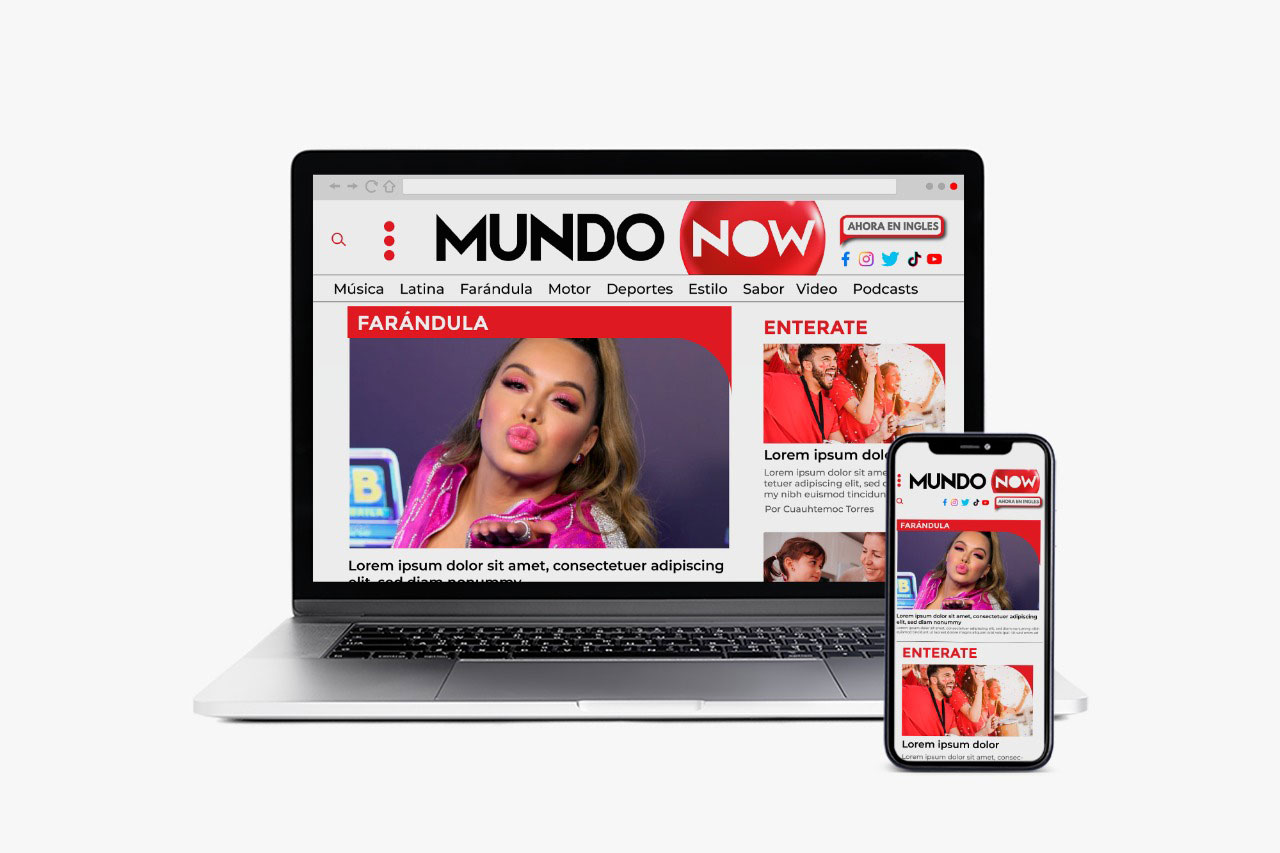
Photograph courtesy of MundoNow
Launched in 1979 as the Latin American Association newsletter, Mundo Hispánico has long been a cornerstone of Spanish-language media in Georgia and beyond, covering everything from breaking political news to the latest telenovela celebrity gossip. When media began trending towards digital platforms, Mundo adapted, adding podcasts and YouTube videos, hosting Facebook livestreams, and earning dedicated social media followings. And as Latino communities in the U.S. grow and change, the Atlanta-based media company is keeping pace: last month, Mundo Hispánico announced it is rebranding as MundoNow, offering culturally authentic content in Spanish and English in order to reach a demographic that is increasingly bilingual and bicultural.
“What we learned based on the 2020 census figures is that there is a sea-change happening within the Hispanic community,” said Rene Alegria, CEO of MundoNow. Historically, Spanish-language media—and, critically, the advertising industry that supports it—has been oriented towards a single demographic: recently-arrived, Spanish-language dominant immigrants. But as Alegria explained, “Those of us who were born in this country, or who immigrated to this country as young children, didn’t fit into that category. We kind of felt left out—what media company was speaking to me?”
In fact, as last year’s census data revealed, it’s those two groups who now comprise a majority of the Latino American community. Today, just 28 percent of Latino American adults are Spanish-language dominant, while close to 70 percent identify either as bilingual or English-language preferred, a proportion that’s rising steadily as immigration rates decline and U.S.-born Latino families grow. Mundo Hispánico saw in those demographic trends a growing demand for bilingual, bicultural media content. The company started producing English-language content in 2020; with the rebrand, MundoNow will privilege thorough reporting in both English and Spanish through a digital-first strategy that reaches younger audiences with podcasting, streaming, and social media.
“MundoNow speaks to that group while not forgetting the Spanish-language groups and recently-arrived immigrants that have come to rely on Mundo for information,” said Alegria.

Photograph courtesy of MundoNow
For Alegria, Mundo’s evolution isn’t just a business move: like his partners, he belongs to the same generations of Latino Americans the company hopes to attract. In 2018, Cox Media Group, Mundo’s then-owner, was looking to either shutter or sell the company. When former state Senator Sam Zamarripa heard from a friend at Cox that Mundo Hispánico was on the chopping block, he sprang into action to finance a buy. Zamarripa asked Alegria if he might be interested in running the new company: the two know each other from the publishing world, where Alegria used to run a Spanish-language imprint for a major publisher (“After 13 years of selling and re-selling ‘Latino 101’, I decided I needed to go it alone,” Alegria recalled with a laugh).
With financing from Marcos Gonzalez, founder of Vamos Ventures, a Los Angeles-based firm that invests primarily in Latino or other minority-owned businesses, Zamarripa and Alegria purchased Mundo; it’s now the largest certified-minority bilingual digital media platform in the U.S..
That MundoNow is led by Latino Americans helps the company stay connected to the communities it serves, producing content that’s authentic and relevant to its viewers. Mundo Entertainment has articles about Ricky Martin’s love life and singer Chiquis Rivera’s birthday celebrations, while MundoNow TV has recipes for Venezuelan Tequeños and interviews with Mexican boxer Abel Aparicio.
But, Alegria is quick to note, Latino Americans want reliable coverage of major news events like everyone else: “If there’s a pandemic in play, content that speaks to the latest information about that pandemic is going to be consumed regardless of . . . that person’s country of origin,” he said.
Mundo’s balancing act between cultural specificity and broadly inclusive value is perhaps best exemplified by its incisive immigration coverage, which has earned the company wide praise in the journalism industry, helping Mundo net 16 Emmy awards in the last three years. In 2019, The New York Times produced an Op-Doc, La Boca del Lobo (In the Mouth of the Wolf) that followed MundoNow investigative journalist Mario Guevara in his daily coverage of immigration arrests in Gwinnett County.
In the short film—which premiered at the Tribeca Film Festival—Guevara drives slowly through housing complexes and strip mall parking lots, asking passersby about any recent arrests or police activity in the neighborhood. “You’re Mario Guevara, right?” a woman says with a shy smile as he waves at her. Guevara, who was a photojournalist in his native El Salvador but fled with his family when gangs threatened his life, muses on camera about the unique position his career provides: he is at once an impartial journalist, bearing witness to the everyday trauma of deportation, and a part of the story himself, the rare immigrant for whom political asylum provided a path to American residency: “I have to be completely impartial, and that’s the hardest part of my job.” Guevara often streams his coverage on Facebook, where he has half a million followers. In a report on Mundo’s journalism model, the Center for Community Media called Guevara a “trailblazer in digital community-based reporting.”
Embracing digital platforms is central to MundoNow’s rebrand. Strategic use of social media and web content has helped Mundo become a major player in Spanish-language news in New York, California, and Texas: its website generates 10 million unique visitors a month, and over 5 million people follow the company on Facebook. The company plans to add more podcasting and streaming services, as well as deepening its editorial content in both Spanish and English. And—staying true to its roots in print—MundoNow still produces a free weekly newspaper, which circulates throughout the Southeast.
Another thing that won’t change is headquarters: MundoNow is proud to be a part of Atlanta’s growing media industry, Alegria said. “We’re really taking a look at making Atlanta a Hispanic media center,” he explained. “The multicultural weaving of ideas . . . is just ripe to do really cool things.”
Atlanta’s Latino population has exploded in the decades since Mundo launched. 2020 Census data revealed that the region’s Hispanic population grew 31 percent in just ten years. Like elsewhere, the makeup of that community has shifted, said Jerry Gonzalez, CEO of GALEO, the Georgia Association of Latino Elected Officials. “The Latino identity is a complex narrative,” Gonzalez explained. He said he was pleased to hear about MundoNow’s shift to a bilingual, bicultural media strategy.
“(Mundo Hispánico) has been a long-standing staple in the Latino community in Georgia,” Gonzalez said. “And seeing this evolution of MundoNow is really exciting—it’s acknowledging the growth of the community, but also the diversity within the community.”









![The North Carolina Museum of Natural Sciences’ newest exhibit is a [pre]historic first](https://cdn2.atlantamagazine.com/wp-content/uploads/sites/4/2024/04/DD-3-100x70.jpg)



